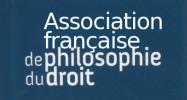Paper's abstract
Pascale
Deumier,
Predictive Justice and the Sources of Law: Substantive Jurisprudence
Predictive justice, considered here as a tool for quantifying the data of the decisions delivered by the trial judges, will directly allow revealing case law, thus making it one source of law. Therefore allowing it to be used by legal professionals well beyond its original predictive function: it is likely to help better legislate, better interpret and better think law - all uses conflicting with the practices of the lawyers as well as with the limits of predictive justice tools. These uses are not insignificant and they indirectly tend to guide case law by its harmonization. If it is a predictive justice stating standards that is seeking this harmonization, it might fetter the sovereign discretion of the judges of the lower courts. On the other hand, predictive justice can help rationalize this same power by calling for appropriate motivation. Predictive justice is then a source of arguments rather than a source of norms and calls for the development of reflections and training on argumentation around substantive issues.
Key Words : caselaw
t. 60, 2018: p. 49-66
